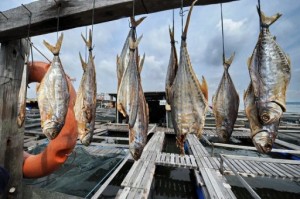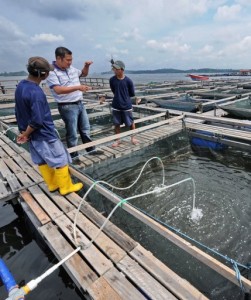Agence France Presse | 25 April 2010
By Bernice Han
SINGAPORE — His wife and business associates say he's mad to invest almost a million Singapore dollars in a fish farm, but Singaporean property developer Eric Cheng does not mind a bit.
The 35-year-old city boy is confident his foray into aquaculture will make money as seafood-loving, import-dependent Singapore strives to boost local production and enhance its food security.
Soaring food prices in 2008, driven by a global supply crunch, reminded Singapore of its vulnerability and prompted the government to take a fresh look at its agricultural policies and support investors willing to go into farming.
Cheng had zero experience running a fish farm but carried out extensive research and spoke to veterans in the trade before deciding to grow and sell garoupa, a fleshy, succulent fish variety popular across Asia.
"They say I am crazy for going into uncharted territory since I know nothing about fish farming, but my business instinct tells me that there are plenty of opportunities," Cheng said in an interview.
"You look at Singapore.... It produces less than five percent of its own consumption and if I can supply in sufficient quantities to the local market, I can make it," he told AFP.
The self-made Cheng is managing director of ECG Group, a property-based concern also involved in car rental, finance and technology.
His new venture is one of 106 licensed coastal fish farms in the city-state, which last December launched a Food Fund of five million Singapore dollars (3.6 million US) to support entrepreneurs willing to venture into farming.
While Singapore has a land area of only 710 square kilometers (284 square miles), most people live in high-rise apartments and industries are clustered together, leaving space available for technology-driven farms.

The port city is also surrounded by waters where floating fish farms can thrive side-by-side with ocean-going vessels loaded with electronics and petrochemicals destined for the world market.
"The Food Fund has been set up to enhance Singapore's food supply resilience especially in chicken, pork, fish, eggs, leafy vegetables and rice," the Agri-Food and Veterinary Authority (AVA) told AFP in a statement.
Specifically, the AVA will co-finance research and development and help upgrade local farms. It will also support feasibility studies on investments in overseas food zones, overseas contract farming and other non-traditional sources.
Singapore's goal is to raise local production of fish to 15 percent of domestic demand from four percent at present, eggs to 30 percent from 23 percent and leafy vegetables to 10 percent from seven percent.
Last year the government announced plans to set aside more land for intensive farming and Mah Bow Tan, minister for national development, said local produce could serve as a "strategic stockpile" for the population, which currently stands at five million.
Specialised farms like Cheng's will play an important role.
The volume of fish captured at sea is expected to decline due to continued over-fishing, said Chin Yew Neng, the AVA's deputy director for food supply.
"To ensure Singapore's fish supply resilience, the way forward is through aquaculture, which is more sustainable," he said.
According to the AVA, fish farms "do not deplete the resources in the sea" as their produce comes from fingerlings mostly produced by hatcheries.
"Some of the fish farms produce the fingerlings themselves," it added.
At Cheng's farm, the new owner has been busy revamping the place and focusing on breeding the high-value tiger garoupa since buying the business last October.
Tiger garoupa, also known as grouper, is popular among ethnic Chinese diners and can easily cost 60-70 Singapore dollars a piece at restaurants, he said.
"The best returns are (from) tiger garoupa," he said at the 38,000-square-foot (3,420-square-metre) fish farm in the eastern part of Singapore, where he is trying to modernise practices -- on the wall a planning chart tells workers when they need to feed and weigh the fish, as well as wash the nets.
Cheng estimates it will take at least two years for his investment to break even, but it is worth the wait.
"It's not difficult to achieve because the returns are quite high if you get it right," he said.
And even if the venture fails, Cheng says he will have no regrets. "In every business, there is a learning experience," he said.












